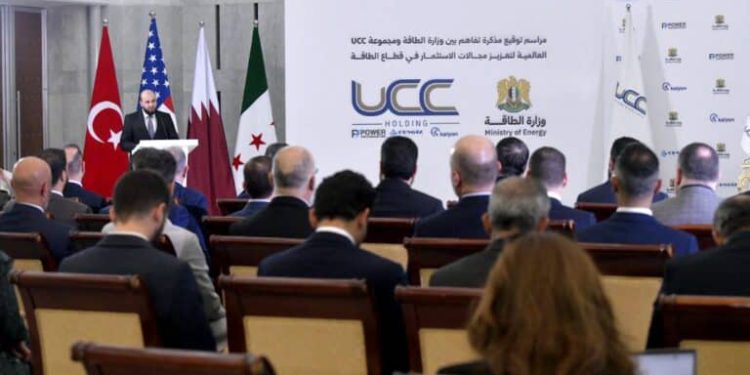In a significant step toward rebuilding its war-damaged infrastructure, Syria’s transitional government has signed a landmark $7 billion energy investment agreement aimed at revitalising the country’s electricity sector and laying the groundwork for renewable energy expansion.
The agreement, signed on Thursday by the Ministry of Energy, will see the development of four combined-cycle gas turbine (CCGT) power plants in the provinces of Deir ez-Zor, Hama (Mhardeh and Zeizoun), and Homs (Tirfawi). Together, these facilities are expected to generate approximately 4,000 megawatts of electricity using advanced American and European technology. An additional 1,000-megawatt solar power project will be constructed in Wadiyan al-Rabi’ in southern Syria.
The deal involves a consortium of regional and international firms, including Qatar’s UCC Holding and Urbacon, Turkey’s Kalyon GES Enerji Yatırımları and Cengiz Enerji, and the U.S.-based Power International USA.
“This is a historic moment,” declared Syrian Energy Minister Mohammed al-Bashir during the signing ceremony in Damascus. “It marks a turning point in Syria’s energy sector and represents a crucial step in rebuilding the country’s critical infrastructure.”
`Bashir emphasized that the agreement would not only help restore power generation but also strengthen regional energy integration and boost Syria’s transition to cleaner, more sustainable energy sources.
According to the minister, the projects will collectively generate 5,000 megawatts of power, significantly improving electricity supply across the country and impacting all aspects of daily life.
Private Sector Engagement and Job Creation
Ramez al-Khayyat, CEO of Urbacon Holding, called the agreement a “new chapter in joint reconstruction efforts,” noting that it signals a broader push toward Syrian energy self-sufficiency and economic recovery.
He added that the implementation of these projects will employ the latest energy technologies and is projected to create more than 50,000 direct jobs and an additional 250,000 indirect opportunities.
Broader Turkish-Syrian Energy Cooperation
The announcement comes just one week after Syria and Turkey signed a separate agreement to cooperate in the fields of energy, mining, and phosphates. Under that deal, Turkish Energy Minister Alparslan Bayraktar confirmed Ankara would supply Syria with 2 billion cubic meters of natural gas annually, enabling the generation of 1,300 megawatts of electricity.
Speaking at a joint press conference in Damascus, Bayraktar also revealed that Turkey has begun delivering 1,000 megawatts of electricity to Syria and that both sides are preparing for joint energy ventures in the short and long term.
Syria’s Energy Minister al-Bashir noted that work is already underway to resume operations on the Kilis–Aleppo gas pipeline, which is expected to be fully operational by June. The pipeline is projected to significantly boost Syria’s electricity generation capacity.
Both sides have agreed to establish technical committees across the energy, mining, and phosphate sectors to expedite the implementation of these agreements, according to Syrian state television channel Al-Ikhbariya.
The multi-billion-dollar investment represents a turning point in Syria’s post-conflict recovery strategy, signaling renewed international confidence in the country’s transitional administration. With a strong focus on energy diversification, regional cooperation, and job creation, Damascus appears poised to make energy security a cornerstone of its economic revival.
This article was translated and edited by The Syrian Observer. The Syrian Observer has not verified the content of this story. Responsibility for the information and views set out in this article lies entirely with the author.


